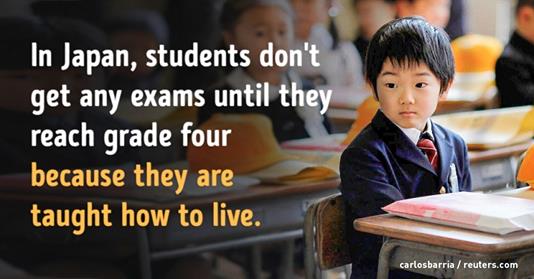“Japan’s incredibly amazing Education System is often credited for the distinctive qualities exhibited by its people, such as intelligence, politeness, and strong health. This system has garnered widespread recognition and admiration worldwide. One crucial aspect of this educational prowess is the emphasis placed on nursing education, which has led to the rise of exceptional nursing professionals in the country.
When it comes to nursing education, for example, Japan boasts a renowned reputation for its commitment to excellence. As a result, the demand for nursing essay writing services has significantly increased to support aspiring nurses in their academic journey. The role of a nursing essay writing service is pivotal in helping students develop their critical thinking, communication, and research skills essential for a successful nursing career.”
1. Manners first before knowledge.

Japanese students don’t get any exams until they’re in grade four. Japanese schools just give them small tests. Their main goal is not to judge the child’s knowledge or learning, but to establish good manners and character development. Kids are taught to respect people, be gentle to animals and nature, as well as qualities like justice, self-control, and grit.
2. Japan’s academic year starts on 1st of April .

April 1 often coincides with the beautiful natural phenomena in the country: the time of cherry blossom. There are 3 trimesters in Japan’s academic year: April 1 — July 20, September 1 — December 26, and January 7 — March 25. Students enjoy 6 weeks of holidays during the summer. They also have 2-week breaks in winter and spring.
3. Students clean their school themselves, as most Japanese schools don’t employ janitors.

Students clean their own classrooms, cafeterias, and even toilets. The Japanese education system believes that this activity will teach student to work as a team and respect the environments.
4. During school lunch, students eat healthy and balanced meals provided on a standardized menu and is eaten together in the classroom.

In public elementary and junior high schools, the lunch for students is cooked by qualified chefs and health care professionals. They all eat together in their classroom with the teacher.
5. After-school activities and workshops are very popular.

Seeing groups of children returning from their extracurricular courses in the evening is a common sight in Japan. Small kids attend an 8-hour school day, but they also study during the holidays and on weekends. No wonder almost no students in this country repeat grades in primary, lower secondary, or secondary school.
6. Students also learn Japanese calligraphy and poetry.

Learning calligraphy, or shodo, teaches Japanese children to respect their own culture and centuries-old traditions. For Japanese people, calligraphy is an art that’s no less popular than traditional painting. They also learn Haiku, a form of poetry that uses simple expressions to convey deep emotions to readers.
7. Nearly all students have to wear a school uniform.

Some schools have their own attire. But traditional Japanese school uniforms are military style for boys and sailor outfit for girls. The purpose of their uniform policy is to remove social barriers among students.
8. School attendance rate in Japan is 99.99%.

Can you name another country that can boast such statistics? Probably a few. In Japan, students don’t skip classes, nor do they arrive late for school. Around 91% of pupils in Japan reported that they never ignored the lessons of theirs teacher.
9. A single test decides the students’ future.

Japanese students have to take a very important exam at the end of high school. This will determine their future. A student can choose one college, and they have to pass the score requirement of said college. If they fail, they probably don’t go to college. They call this period of preparation for the entrance exam the ’examination hell’ because the competition is very high — only 76% of them can continue their education after high school. In order to get high scores, students can find an essay writer who can help with homework at school
10. College years are the best “holidays” for Japanese students.

Once they pass the ‘examination hell,’ Japanese students consider it the start of the best years of their life. Sometimes, Japanese people call this period an exciting ’vacation’ before work.
Preview photo credit: carlosbarria / reuters.com
Based on materials from tofugu,
novakdjokovicfoundation, examen, psychologos

